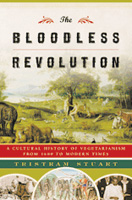home | metro silicon valley index | the arts | books | review

The Bloodless Revolution: A Cultural History of Vegetarianism From 1600 to Modern Times
(By Tristram Stuart: Norton: 628 pages; $29.95 cloth)
Tristram Stuart begins his meaty (to use the wrong word altogether) study of vegetarian thought and practice with a significant observation: "Having accustomed themselves to thinking of Europe as the pinnacle of humanity, travellers were shocked to find in India a thriving religion which had been sustained in a pristine form since well before ... the invention of Christianity." In the 17th century, the European encounter with Hinduism and its doctrines forbidding the eating of meat and the slaughter of animals, unleashed a host of vegetarian movements. With great panache, Stuart examines the many forms these contrarian ideologies took root. Some Christians believed that before the Fall, man did not need to kill animals for food; others argued that meat eating aggravated the blood and led to wars. Francis Bacon thought that a vegetable diet led to longer life. For Roger Crab , "Meat was a sign of wealth; renouncing it was an act of solidarity with the oppressed." Stuart also notes the closing of the circle that took place when the young Gandhi was converted to vegetarianism in England. No matter what you eat for dinner and why, The Bloodless Revolution dishes up a fascinating cultural history, on a par with Simon Schama's Citizens. Stuart has left no eccentric unturned, from the "vegetarian prodigal hermit" Thomas Bushell to Dr. John Pordage, the leader of the mystic Philadelphian Society, who counseled extreme fasting and hosted "crazed spiritual revelries," to John Oswald, a political chameleon who fought for the French Revolution and whose "espousal of Indian vegetarianism united radical politics and animal rights."
Review by Michael S. Gant
Send a letter to the editor about this story.
|
|
|
|
|
|